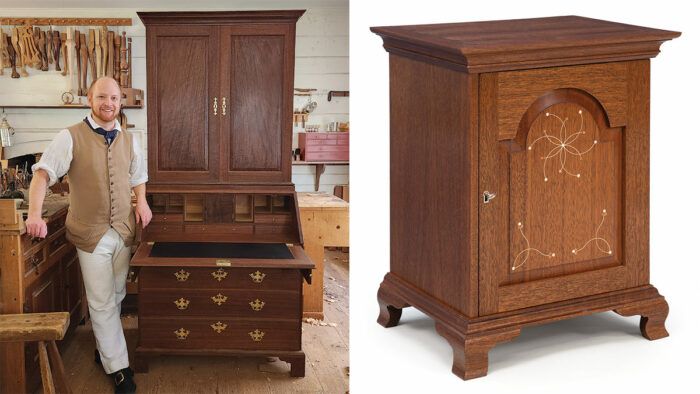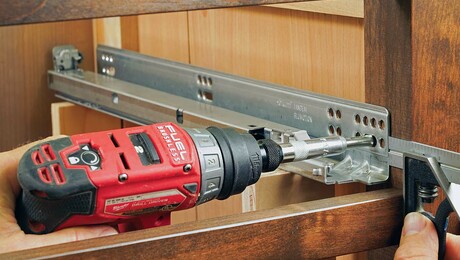Jeremy Tritcher: The adventure continues
From studying with Chris Gochnour to enrolling at North Bennet Street School to a full-time dream job in the Hay Cabinet Shop in Williamsburg, Va., furniture making has been a rewarding second career for Jeremy Tritchler.
Synopsis: From studying with Chris Gochnour to enrolling at North Bennet Street School to a full-time dream job in the Hay Cabinet Shop in Williamsburg, Va., furniture making has been a rewarding second career for Jeremy Tritchler. Recently he started a new chapter of his adventure, building his independent furniture business from home while he helps take care of his children.
After majoring in geology at the University of Wyoming, Jeremy Tritchler landed a contract job in a Utah copper mine, examining drilled cores, which are used to explore potential tunneling directions. After looking at 15 miles of cores over four years, he felt like “there was no end in sight,” he said. “I had a strong desire to be creative. I wanted to see the beginning, middle, and end of a project.”
Reflecting back on his youth, he remembered using his father’s hammer, nails, and wood scraps to bang together simple boxes and toy cars in the garage, and working with his grandfather, who helped him build his first toolbox from an old ammo crate.
He also happened to meet an experienced woodworker at the mine, a fellow geologist and longtime FWW subscriber, who was retiring soon to pursue the craft in earnest. Tritchler learned a few basics from his friend and caught the woodworking bug, finding the sense of accomplishment he was missing. When his friend confided, “I wish I had started doing this 30 years ago,” Jeremy took it to heart.
When his contract was terminated in 2012, a delayed casualty of the 2008 economic crash, Tritchler was unable to find another job as a geologist, so he took one building laminated countertops and desktops. It wasn’t fine woodworking, but it was a step in the door. “I worked with my hands every day, and felt the satisfaction of seeing a finished product,” he said. “You know when it’s good, and you know when you’ve made a mistake. It’s a rewarding feeling that’s hard to describe.”
When another friend invited Tritchler to join him as a handyman and remodeler, he accepted the offer, taking on the fine finish work. On nights and weekends, he took woodworking classes at nearby Salt Lake Community College (SLCC), where he met the most influential figure in his journey, FWW contributing editor Chris Gochnour.
One great teacher can change everything

In Gochnour’s classes on the fundamentals of fine woodworking, Tritchler made his first real furniture joints and his first solid-wood project, a beautiful tool box. “It was my first time picking out nice lumber. When the oil and the hardware were on, I thought, ‘Wow, this is really something to be proud of.’”
Next Tritchler made a pair of sofa tables with his new teacher, and then a slant-top desk of his own design.
Aside from the hows and whys of the craft, Gochnour taught Tritchler that woodworking was a viable career. “Chris talked to us about why he became a woodworker,” Tritchler said. “He was around 30 when he made furniture making his career. He took the plunge and made it work. I was in my 30s then, deciding what I wanted to do with my life, and I was inspired to take the same chance.”
When Tritchler told his teacher he wanted a career as a furniture maker, Gochnour recommended North Bennet Street School (NBSS) in Boston.
Formal training at North Bennet
Tritchler was accepted into NBSS’s Cabinet & Furniture Making program in the fall of 2016, and made the most of his two years there, completing 16 or 17 projects in the time some students complete five or six. Many were smaller projects, designed to teach him something new.
“I absolutely loved NBSS,” he said. “They don’t hand you all the knowledge. They give you enough instruction to point you in a direction, then they let you work it out yourself with trial and error—hands on. When you get hung up, they get you back on track.”
After graduating in 2018 he landed a job at a small cabinetry and millwork shop in Boston that focused on commercial construction and remodeling. As “the custom guy for oddball jobs,” Tritchler worked on kitchen cabinets, restaurant bars, and common areas in apartment complexes, dressing up one with big wall-hung shadow boxes for plant life.
Opportunity of a lifetime
Scanning Instagram one day, Tritchler ran across a post that changed his life again. The post came from Bill Pavlak, supervisor of the historical Hay Cabinet Shop at Colonial Williamsburg (CW). Tritchler was no stranger to the Hay shop, having visited it two years earlier and spoken with apprentice cabinetmaker Brian Weldy, also an NBSS grad.
Weldy suggested what Tritchler might highlight in his cover letter, and told his boss to look out for his application. Tritchler was hired, his wife got approval to work remotely, and they moved with their young daughter to Williamsburg.
He started in January 2020, working at a massive workbench, in a wash of natural light from a nearby window (electric lights are not allowed in the shop). His job, like those of the shop veterans around him, was reproducing antique furniture from tidewater Virginia—drawing from the deep institutional knowledge at the living-history museum, as well as tapping its world-class archives and collections.

“There aren’t a lot of written records of woodworking techniques in the 18th century,” he said. “We worked closely with Colonial Williamsburg’s [museum] curators and tradespeople to help each other better understand how things may have been done.”
“I was in a euphoric state,” he said. It felt like “an extended vacation,” like he would soon have to pack up his bags and leave. Then, after just three years at his job-of-a-lifetime, his premonition came true.
A new chapter unfolds
Early in 2023, with a second child on the way and a big upsurge in child-care costs looming, Tritchler and his wife, Shaun, were facing some tough math. Her job as a financial analyst paid considerably more than his, so he made the decision to leave the job he thought he would retire from someday, to be at home with the kids and build up an independent furniture-making and teaching career. Once again, he received encouragement from Gochnour, who had balanced his own woodworking career with child care, for similar reasons.
“My resignation letter to Bill [Pavlak] was very hard to write,” Tritchler said. “I gained a lot of confidence in my work and my abilities at CW. I came to the shop with a good understanding of how to use hand tools, but I left with them feeling more like an extension of myself.”
The first reproduction he built at CW (shown above) was of a small tea table with cabriole legs, believed to have been built in Williamsburg in the 1720s. The table was relatively simple in design, but had a tricky piece of curbed molding that wrapped around the aprons and legs. “It was a good chance to stretch my brain and build my skills,” he said.

Tritchler left CW in June of this year, and is working on bringing his garage workshop up to speed. Commissions have begun to roll in, which he should be able to juggle with his duties as a dad. As the kids grow, however, and begin spending more time at school, Tritchler is mulling bigger plans.
At NBSS and CW, Tritchler learned that he “thrives on camaraderie and collaboration with other makers.” While he would be perfectly happy building commissions in the garage, he says, he is thinking about buying a large warehouse or factory space where he can set up a larger shop for working and teaching, and rent space to others as well.
“There are a lot of makers in the [Williamsburg] area, and I picture the co-op as a community-oriented place,” he said. “Some of my friends at NBSS were veterans with PTSD. Focusing on a trade helped them adjust to civilian life, gave them purpose.”
He pictures a lot of young people also being drawn to the co-op. “Not everyone has to go to college to be successful,” he said.
Credit where credit is due
At each of his life transitions, Tritchler received unflinching support from his wife, who began her career in the arts, as a ballerina. She encouraged him to leave his career as a geologist to pursue his true passion, including the daunting move from Salt Lake City to pricier Boston. For the move to Williamsburg, she convinced her bosses at an environmental consulting firm to let her work remotely in Virginia. “I’m the one who gets cold feet,” he said. “She always says, ‘We’ll make it work—we’ll get there.”
Follow Tritchler’s journey on Instagram, @jtritchler.
Asa Christiana is FWW’s editor-at-large.
From Fine Woodworking #305.
Fine Woodworking Recommended Products

Blum Drawer Front Adjuster Marking Template





















Log in or create an account to post a comment.
Sign up Log in